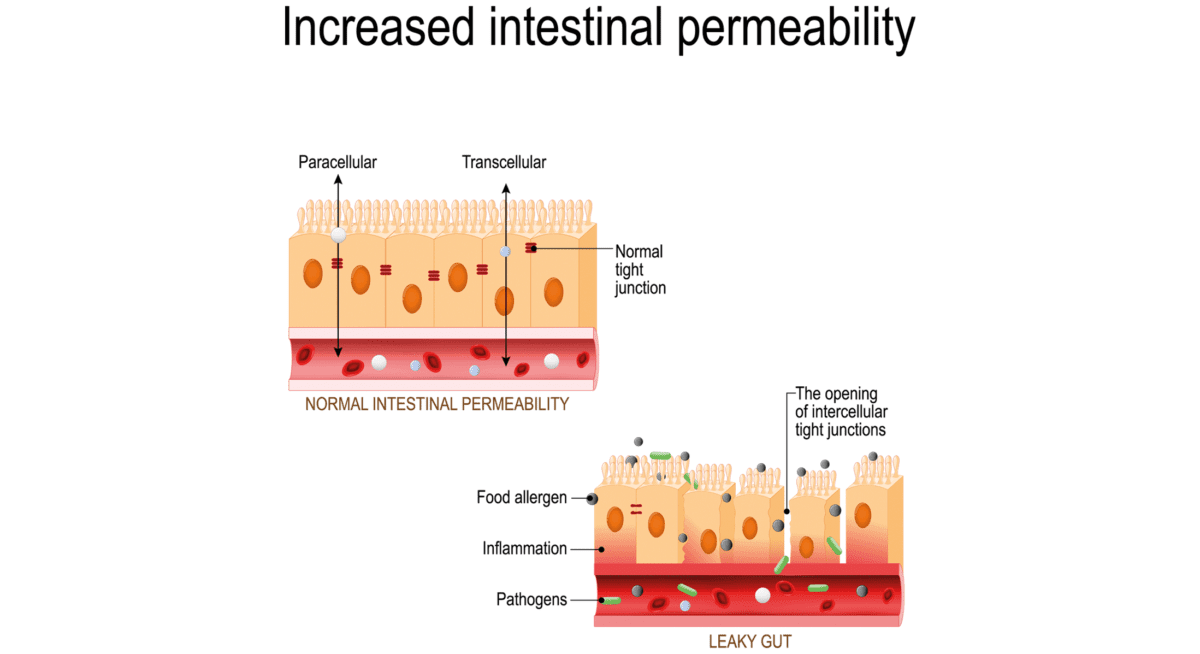In recent years, “Leaky Gut Syndrome” has become a popular term in health and wellness circles, often linked to a variety of chronic conditions and symptoms. But what exactly is leaky gut, and does it really exist as a medical condition? While the concept of leaky gut is widely discussed, its legitimacy remains a subject of debate within the medical community. In this article, we will explore what leaky gut is, its potential symptoms, and what the current science says about its existence.
What is Leaky Gut?
Leaky Gut Syndrome, also known as increased intestinal permeability, refers to a condition where the lining of the small intestine becomes damaged, allowing undigested food particles, toxins, and bacteria to “leak” into the bloodstream. This leakage can trigger an immune response, potentially leading to inflammation and a range of health issues.
- The Gut Barrier Function
- The intestinal lining is made up of epithelial cells that are tightly joined together, forming a barrier that controls what passes through to the bloodstream. This barrier is essential for nutrient absorption while keeping harmful substances out (learn more about gut barrier function).
- When the integrity of this barrier is compromised, it can lead to increased intestinal permeability, often referred to as a “leaky gut.”
- Potential Symptoms of Leaky Gut
- Individuals with increased intestinal permeability may experience symptoms such as bloating, gas, diarrhoea, constipation, and abdominal pain. Beyond digestive issues, leaky gut has also been linked to systemic symptoms like fatigue, headaches, joint pain, and skin conditions such as eczema.
- Some researchers and health practitioners believe that leaky gut may contribute to the development of autoimmune diseases, allergies, and even mental health conditions like anxiety and depression (explore the gut-brain connection).
What Does the Science Say?
While the concept of leaky gut has gained traction in holistic and alternative medicine, its recognition in mainstream medicine is more cautious. Here’s what the current research reveals:
- Evidence for Increased Intestinal Permeability
- Scientific studies have confirmed that increased intestinal permeability does exist, in some individuals with certain chronic conditions such as Crohn’s disease, celiac disease, and irritable bowel syndrome (IBS). In these cases, a damaged gut lining allows substances to pass through that would normally be blocked (read about IBS and gut health).
- However, the broader concept of “Leaky Gut Syndrome” as a standalone diagnosis is not widely accepted. Many experts argue that while increased intestinal permeability can occur, it is often a symptom of other underlying conditions rather than a distinct disorder.
- The Role of the Gut Microbiome
- The gut microbiome plays a crucial role in maintaining the integrity of the gut barrier. A balanced and diverse microbiome supports the production of short-chain fatty acids (SCFAs) like butyrate, which help strengthen the gut lining and reduce inflammation.
- Dysbiosis, or an imbalance in gut bacteria, has been linked to increased intestinal permeability. Factors such as poor diet, chronic stress, and antibiotic use can disrupt the microbiome, potentially leading to a leaky gut (learn about the importance of gut microbiome health).
- Controversy and Ongoing Research
- The debate around leaky gut continues as more research is conducted. Some studies suggest that increased intestinal permeability could be a contributing factor to a variety of chronic conditions, but more evidence is needed to establish a direct causal relationship.
- Mainstream medicine calls for more rigorous studies to determine the extent to which leaky gut contributes to health issues and whether targeting intestinal permeability can be an effective treatment strategy.
Managing Gut Health: What You Can Do
Whether or not leaky gut is recognized as a distinct condition, maintaining a healthy gut is essential for overall well-being. Here are some strategies to support gut health and potentially reduce intestinal permeability:
- Incorporate Prebiotic Foods
- Prebiotics are non-digestible fibres that feed beneficial gut bacteria, helping to promote a balanced microbiome. (discover prebiotic-rich foods).
- By nourishing your gut bacteria, prebiotics can help support the gut barrier and overall digestive health.
- Consume Probiotic-Rich Fermented Foods
- Fermented foods are excellent sources of probiotics—beneficial bacteria that support gut health. These foods can help maintain the integrity of the gut lining and reduce inflammation (explore the benefits of fermented foods).
- Adopt a Gut-Friendly Diet
- A diet rich in whole, unprocessed foods supports gut health and reduces the risk of dysbiosis. Focus on consuming plenty of fruits, vegetables, whole grains, and healthy fats. Limit the intake of processed foods, sugars, and alcohol, which can disrupt the microbiome and contribute to gut issues.
- Manage Stress and Sleep
- Chronic stress and poor sleep quality can negatively impact gut health and potentially increase intestinal permeability. Incorporate stress-reduction techniques such as mindfulness, meditation, and yoga to promote relaxation and support the gut-brain axis.
- Prioritize sleep hygiene by establishing a regular sleep schedule, creating a restful environment, and limiting screen time before bed (discover stress management tips).
- Consider Supplementation
- Some supplements may support gut health by reducing inflammation and promoting the repair of the gut lining. Always consult with a healthcare provider before starting any new supplements to ensure they are appropriate for your specific needs.
The Takeaway: A Balanced Approach to Gut Health
While the concept of leaky gut remains controversial, there’s no doubt that maintaining a healthy gut is crucial for overall health. By focusing on a balanced diet, incorporating prebiotics and probiotics, managing stress, and considering targeted supplements, you can support your gut health and potentially reduce the risk of increased intestinal permeability.
Book Your Consultation Today
If you’re experiencing digestive issues or want to learn more about how to support your gut health, I’m here to help. Together, we can create a personalized plan that addresses your unique health needs and promotes overall well-being.
#LeakyGut #GutHealth #Nutrition




